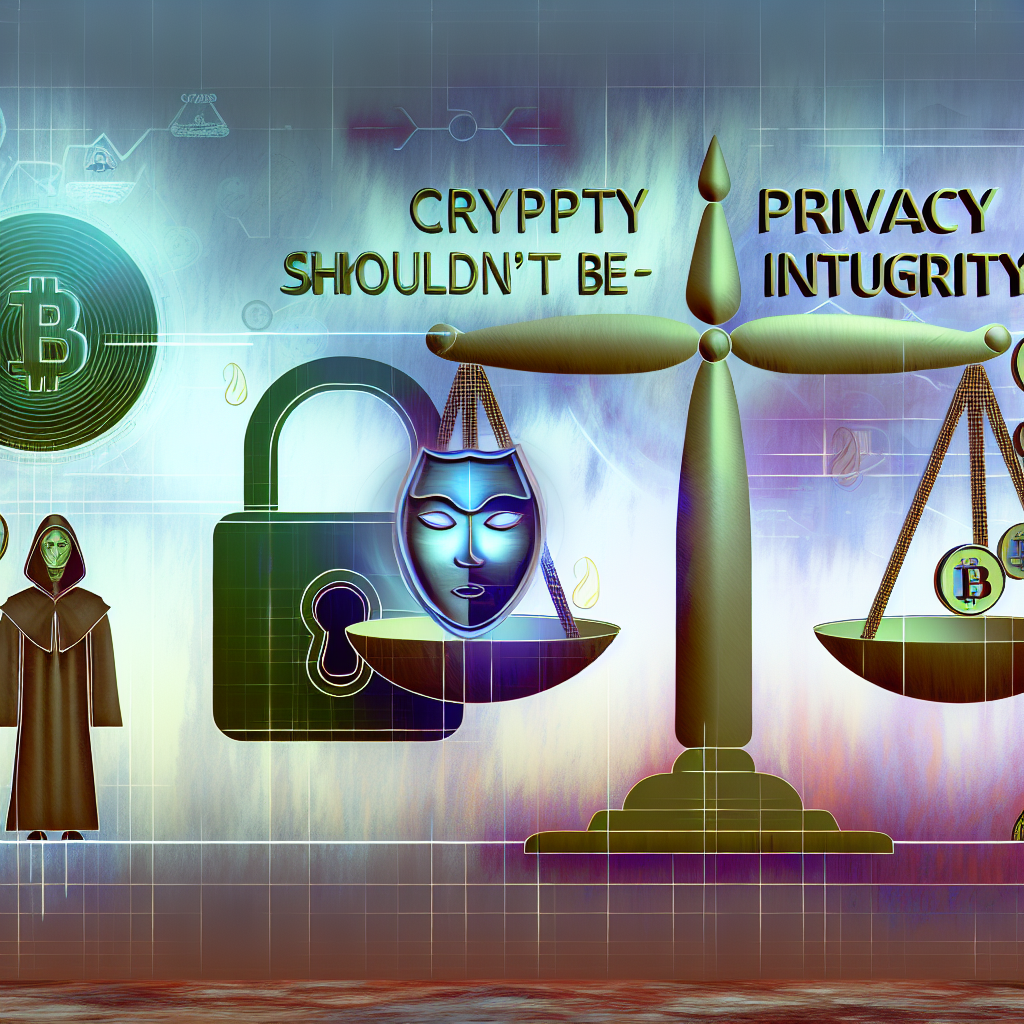
The world of cryptocurrency has always had a complex relationship with privacy. Since its cypherpunk roots in the 1990s, a time when cryptographers and activists circulated manifestos advocating for encryption to counter government surveillance, privacy has been viewed as almost inviolable. Eric Hughes, one of the pioneers of the cypherpunk movement, declared in 1993 that “cypherpunks write code” instead of waiting for governments to safeguard their freedoms. John Gilmore, another early cypherpunk, insisted on assurances “with physics and mathematics, not with laws” that could thwart even the NSA. This radical philosophy birthed Bitcoin and spurred the creation of coins like Monero and Zcash, aimed at facilitating truly untraceable transactions.
The crypto community’s dedication to privacy has intensified under regulatory scrutiny. Following the U.S. government’s sanctioning of Tornado Cash in 2022, Vitalik Buterin publicly defended his use of the mixer for charity, while advocacy groups labeled the move unconstitutional. The use of privacy coins skyrocketed in response—despite exchanges delisting them, Monero hit all-time transaction highs. By 2023, over 25 Bitcoin firms banded together against proposed anti-mixing regulations, and leaked 2025 DeFi KYC mandates prompted significant online backlash.
This resistance highlights a genuine demand for financial privacy, but enthusiasm alone won’t break the stalemate. Both sides have legitimate concerns, yet the debate has solidified into a rigid standoff. What’s essential is not louder arguments for extreme positions, but rather a sincere middle ground.
The regulatory reckoning
An absolutist position on privacy may sound principled in theory, but in practice, it alienates the very institutions and businesses that could effectively scale blockchain technology. Due to compliance pressures and rising risks, major exchanges have systematically dropped privacy coins. By 2025, 73 exchanges globally had removed them, and the European Union will effectively prohibit “anonymity-enhanced” cryptocurrencies from regulated services by 2027. Japan and South Korea have already banned exchanges from listing such assets.
In discussing Monero, developer Francisco Cabanas told Reuters that the currency “doesn’t selectively encourage crime; it promotes commerce.” It’s a valid observation. However, regulators view total anonymity as unworkable, resulting in privacy coins largely existing outside of the conventional financial system.
This situation creates a dilemma where privacy purists resist any compromise, seeing it as a betrayal of the foundational ideals of cryptocurrency—while governments and compliance officers perceive unregulated anonymity as an open invitation for money laundering. This deadlock benefits no one except perhaps criminals, who represent a minuscule fraction of users but capture disproportionate media attention.
Ironically, most criminals still favor Bitcoin over privacy coins precisely because it’s more liquid and easier to cash out, despite its traceability.
The irony is profound. Cryptocurrency was intended to democratize finance, yet privacy maximalism has made it more difficult for average citizens to access privacy-driven solutions. Monero has been relegated to obscurity on regulated exchanges. Even Zcash, which offers users the choice between transparent and private transactions and has attempted constructive engagement with policymakers, faces relentless delisting pressure. The technology works extremely well; the politics do not.
When anonymity becomes a liability
We must confront an uncomfortable truth: radical privacy does not scale and fails to cultivate the trust necessary for widespread adoption.
Everyone champions privacy until their funds vanish into an irreversible, untraceable abyss. There’s a reason most Zcash users still opt for transparent transactions, and it’s not merely technical friction. People desire recourse. They want the ability to demonstrate their funds’ origins or defend themselves in disputes. Total anonymity may seem liberating until one needs to prove they are not a criminal.
The answer is not to abandon privacy. Instead, it involves integrating compliant privacy from the outset. Technologies like zero-knowledge proofs make this feasible. ZK-SNARKs, the cryptographic innovation behind Zcash’s shielded transactions, allow users to verify truths without disclosing underlying data.
Vitalik Buterin proposed “Privacy Pools” where users could show via zero-knowledge proofs that their funds do not originate from prohibited sources, achieving both anonymity and regulatory trust. As he suggested, this could serve as “neutral infrastructure for integrating public blockchains into regulatory compliance.”
Critics might argue that the government’s demands for personal and private data on-chain are boundless, leading to disclosures that extend beyond legal limits and into unfettered surveillance. However, what better way to counteract criticism than to adopt a technology capable of selective disclosure? “Isn’t this what you requested?” we could assert.
This is pragmatism, not capitulation. The alternative is even more concerning: enterprises retreating into permissioned blockchains that contradict everything cryptocurrency was designed to accomplish. If public blockchains cannot adapt to fundamental legal requirements regarding disclosure and compliance, companies will inevitably create isolated environments where they maintain total control. We’ll end up witnessing the centralization that cypherpunks feared, albeit in different forms. Three cheers for that, I suppose?
A spectrum, not a binary
Critics will argue that any compromise undermines the entire structure, asserting that selective disclosure or accountable privacy creates vulnerabilities. Yet this line of reasoning overlooks reality. Both Monero and Zcash already have view keys allowing users to voluntarily disclose transaction histories to auditors or investigators. The difference lies in these features being user-governed rather than obligatory. That’s not a flaw; it’s a characteristic that honors individual choice while still facilitating compliance when necessary.
Our stance should be that this is what you—the regulators, the policymakers—have requested. Let technology provide the remedy. Coinbase (and others) have sought regulators to accept decentralized IDs and zero-knowledge proofs as valid identification methods. In my view, this is the correct direction.
The stakes transcend ideological integrity. Privacy coins contribute only 11.4% of global cryptocurrency transactions, and their market share isn’t expanding rapidly enough to make a significant impact. Meanwhile, the technologies that underlie them—ring signatures, stealth addresses, zero-knowledge proofs—could revolutionize our perceptions of financial privacy universally. Ethereum is investigating privacy-enhancing layer-2 and layer-3 solutions. Traditional finance is exploring confidential transactions. However, none of this potential will materialize if discussions remain stuck in 1993, when cryptographer Phil Zimmermann released PGP encryption as a deliberate challenge to government prohibitions.
I believe that the essence of the cypherpunk vision was not about unqualified secrecy devoid of nuance. It was about empowering individuals to “selectively reveal” themselves instead of enduring constant surveillance. That objective remains worthy of pursuit. Yet selective revelation requires flexibility, not rigidity. It necessitates understanding that privacy and transparency are not binary opposites but exist along a spectrum, and that pinpointing the appropriate equilibrium is more crucial than defending theoretical absolutes.
Unless more voices within the cryptocurrency community adopt this viewpoint, privacy will remain either illegal or impractical for the majority of users. That is an outcome no one should endorse. The technology exists to achieve more. What is lacking is the resolve to transcend purity tests and construct systems that genuinely function in the real world.

